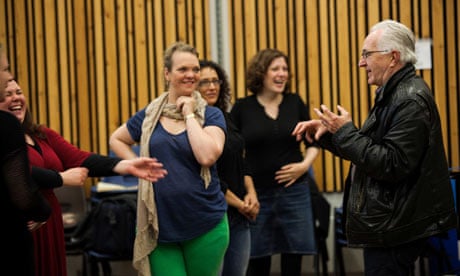Wagner's Ring is the ultimate test for an opera company: an epic, 16-hour cycle of four mythological operas that is both expensive to stage and to watch. A stalls seat for the Royal Opera's cycle later this year costs £1,000; while the most recent attempt of a British regional company to mount the work – by Scottish Opera in 2003 – almost resulted in the company going out of business.
So how is a medium-sized touring company expected to produce the Ring and remain solvent? Last year Opera North undertook the biggest project in the company's 34-year history, to mount one instalment of the cycle a year between 2011-14. Given the financially straitened times, it might seem to be grand folly. Yet the project has been determined by the controversial, yet cost-effective decision to present the operas as semi-staged versions in concert halls rather than theatres.
"Producing the Ring is a rite of passage which every opera company aspires to undertake," said Opera North's general director, Richard Mantle. "But I was adamant that we would not bankrupt ourselves doing it."
The decision to perform the operas in concert was pragmatic – the orchestra pit of the company's home at Leeds Grand Theatre is too small to accommodate a Wagnerian ensemble of almost 100 musicians, not to mention Das Rheingold's complement of 18 tuned anvils. Yet, as Mantle said: "We are in the business of producing drama. It was vital that we did not end up making the Ring look like [Handel's] Messiah, with penguin suits and music stands."
A compromise was devised whereby the singers and orchestra appeared beneath a triptych of giant video screens featuring a visual commentary created by director Peter Mumford. So far, the gamble seems to have paid off: the reception accorded to the opening opera of the cycle, Das Rheingold, suggested the lack of a theatre meant no absence of theatricality. The Guardian's reviewer, Tim Ashley, praised conductor and Opera North music director Richard Farnes's "sense of the ebb and flow of Wagner's vast musical paragraphs" and concluded that the production was "one of the most enthralling Wagner performances of recent years".
Producing the Ring – even in stripped-down fashion – will cost an estimated £1.5m over four years, though the expense has been offset by a partnership with the Sage in Gateshead, the Symphony Hall in Birmingham and the Lowry in Salford; while a Ring Fellowship of private investors aims to raise £600,000.
Canny economies have enabled the project to go ahead: the company bought a rare set of secondhand Wagner tubas - a cross between a French horn and a tuba - which Mantle described as "nicely blown-in"; and the costume budget has been minimised by asking singers to bring their own. "All the Rhinemaidens wore their own black concert frocks," Mantle said. "All we gave them was some elbow-length gloves."
The savings also keep ticket prices down. Seats for the second opera in the cycle, Die Walküre range from £17 to £50, while Farnes said the on-screen commentary was calculated to appeal to Wagner virgins. "It ought to be a comparable experience to a really absorbing movie," Farnes said. "I don't think it diminishes the Ring in any way to say that it is like the most sublime film music ever created. Wagner spent his life pursuing his ideal of the gesamtkunstwerk, a synthesis of all the arts. I have no doubt that if he were alive today he would be working in Hollywood."
Opera North's concept commits the Wagnerian heresy of placing the orchestra in view. The composer's theatre, the Festspielhaus in Bayreuth, was designed with a covered orchestra pit so the music appeared miraculously to emanate from nowhere. But, Farnes said: "A full, Wagnerian orchestra with multiple harps and augmented brass is a breathtaking sight in its own right. You can also make a strong case that orchestration as rich and full as Wagner's sounds to better advantage in concert venues such as Leeds Town Hall or the Sage rather than the dry acoustic of most theatres."
Is Opera North on course to realise Wagner's ultimate vision of presenting all four operas on consecutive evenings? Mantle was cautious. "It's too early to speak of complete cycles. But we are quietly confident for 2015."
If the company pulls it off, it might be that Opera North's austerity Ring marks a paradigm shift in Wagnerian performance. The concept has already begun to attract the attention of other European and American opera houses. "It may seem crazy, putting on the Ring at a time of global economic crisis," said Mantle. "Yet the whole cycle is basically about what happens when the gods fail to keep up the mortgage payments on Valhalla. It really is an opera for our time."
